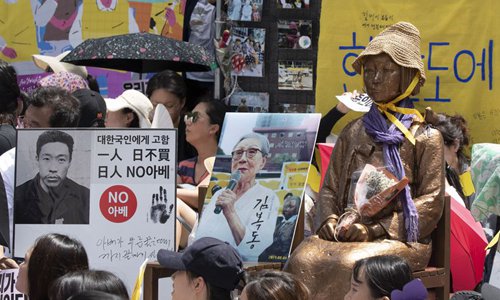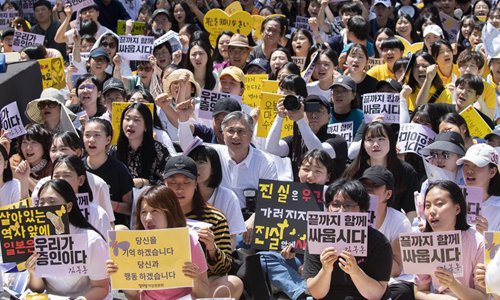HOME >> PHOTOS
S.Korea commemorates memorial day for "comfort women"
Source:Xinhua Published: 2019/8/15 14:00:51

South Korea's government and people commemorate the memorial day for Korean women, who were forced into sex slavery for Japan's military brothels during WWII, in Seoul, South Korea on Aug. 14, 2019. (Xinhua/Lee Sangho)

South Korea's government and people commemorate the memorial day for Korean women, who were forced into sex slavery for Japan's military brothels during WWII, in Seoul, South Korea on Aug. 14, 2019. (Xinhua/Lee Sangho)
The South Korean government and people on Wednesday commemorated the memorial day for the Korean women who were forced into sex slavery for Japan's military brothels during World War II.
The government-led ceremony was held for the second time in central Seoul to mark the date when the late victim of wartime sex servitude, Kim Hak-sun, first publicly testified about her painful memory on Aug. 14, 1991.
The testimony became an opportunity to make Japan's wartime atrocity known to the general public, and other victims followed suit, influenced by her courage. The government designated Aug. 14 as a national commemorative day in 2018.
Hundreds of thousands of Asian women were forced to serve as sex slaves for the Japanese army during World War II, including many from the Korean Peninsula. The victims, euphemistically called "comfort women," were kidnapped, coerced or duped into sex enslavement.
"We are able to honor the comfort women victims thanks to the late grandmother Kim Hak-sun making her first testimony about her story as a victim 28 years ago today. On that day, she broke the long silence of all the victims by saying, 'I am living proof'," South Korean President Moon Jae-in said in a message to the memorial day.
"Grandmothers who could lay open their sorrows and anguish thanks to Kim Hak-sun's courageous decision did not simply stay victims," said Moon, referring to the Wednesday protest rally, attended by ordinary people and the elderly victims.
The 1,400th Wednesday rally, first staged in 1992, was held in front of the Japanese Embassy in Seoul earlier in the day, demanding the Japanese government's sincere apology and legal reparation for Japan's wartime crime against humanity.
"I have learned that we have no future after forgetting history. I came here because I agree with it ... Abe's apology to comfort women grannies will be an opportunity to stop (confrontational) relations (between South Korea and Japan)," Kim Kyung-hee in her 50s told Xinhua during the Wednesday demonstration.
"Japan must apologize first. It's the same about the forced labor and the comfort women issues. Without apology, the issues will not be resolved," said Im Kuk-pyeong in his 50s.
"The Japanese government did not acknowledge and apologize for historical issues. Furthermore, (Japan) tightened control over export to (South) Korea and removed our country from whitelist. It was Japan's preemptive attack. It is natural that (South) Korean people are enraged and fight against it," said Lee Kyung-seo, an undergraduate in his 20s.
Japan removed South Korea earlier this month from its whitelist of trusted trading partners, which are given preferential export procedure, after tightening regulations last month on its export to South Korea of three materials vital to make memory chips and display panels. In response, South Korea also dropped Japan off its whitelist.
Japan's export curbs came in an apparent protest against the South Korean top court's ruling that ordered some of Japanese companies, including Nippon Steel and Mitsubishi Heavy Industries among others, to pay compensation to the South Korean victims who were forced into hard labor without pay during the colonial era.
"Japan is a country which started World War II, but it has yet to apologize and compensate for the wartime history to (South) Korea," said Lee Soo-min, an undergraduate in her 20s, adding that the South Korean people's anger at the Abe government would be eased only after Japan's sincere apology and compensation.
Posted in: WORLD